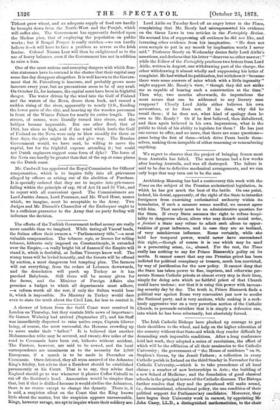Lord Airlie on Tuesday fired off an angry letter in
the Times, comphtirring that Mr. Beesly had misrepaesented his evidence on the Game Laws in two articles in the. Fortnightly Review.. He accused him of suppressing all' evidence he did not like, and inventing other evidence from his imagination. "He does not even scruple to put in my mouth by implication words I never said." Professor Beesly on Wednesday denies flatly Lord Airlie's assertions, and declares that his letter " deserves no other answer ; while the Editor of the Fortnightly produces two letters from Lord Airlie, written in August; one withdrawing part of the charge, the- other withdrawing it ahuost wholly and suppressing his letter of complaint. He hadwished its publication, but withdrew it " because. there were some answers of mine which with a little ingenuity " might support Mr. Beealy's view, " though they did not strike me as capable of bearing such a construction, at the time." Then why, two months afterwards, do imputations the most severe that can be addressed to any literary man reappear Clearly Lord Airlie either believes his own accusations, or he does not. If he does, why did he- recall them ; if he does not, what kind of apology does he owe to Mr. Beesly ? Or if he first believed, then disbelieved, and then again believed in his own impressions, what is the public to think of his ability to legislate for them ? He has just one excuse to offer, and no more, that there are some questions— game being the first of them—which drive Peers beside them- selves, making them incapable of either reasoning or remembering anything.






































 Previous page
Previous page